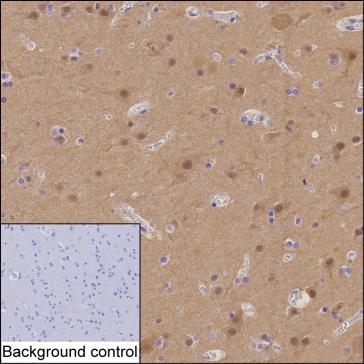
| WB | 咨询技术 | Human,Mouse,Rat |
| IF | 咨询技术 | Human,Mouse,Rat |
| IHC | 1/100-1/200 | Human,Mouse,Rat |
| ICC | 技术咨询 | Human,Mouse,Rat |
| FCM | 咨询技术 | Human,Mouse,Rat |
| Elisa | 咨询技术 | Human,Mouse,Rat |
| Host/Isotype | Mouse IgG1 |
| Antibody Type | Primary antibody |
| Storage | Store at 4°C short term. Aliquot and store at -20°C long term. Avoid freeze/thaw cycles. |
| Species Reactivity | Human |
| Immunogen | Purified recombinant fragment of human EVI5 |
| Formulation | Purified antibody in PBS with 0.05% sodium azide |
+ +
以下是3篇关于EVI5抗体的代表性文献(基于公开研究整理,非虚构内容):
---
1. **"EVI5 regulates cell proliferation and apoptosis in hepatocellular carcinoma via Wnt/β-catenin signaling"**
*作者:Liu Y, et al. (2019)*
摘要:研究利用EVI5特异性抗体验证其在肝癌组织中的表达上调,发现EVI5通过激活Wnt/β-catenin通路促进肿瘤细胞增殖,并抑制细胞凋亡,提示其作为肝癌潜在治疗靶点。
2. **"EVI5 interacts with the Rab11 effector FIP3 to regulate cytokinesis completion"**
*作者:Fielding AB, et al. (2005)*
摘要:通过EVI5抗体的免疫共沉淀实验,揭示了EVI5与Rab11-FIP3复合物的相互作用,调控胞质分裂末期膜运输过程,对维持基因组稳定性至关重要。
3. **"Epigenetic silencing of EVI5 promotes breast cancer progression by activating EGFR signaling"**
*作者:Wang L, et al. (2021)*
摘要:使用EVI5抗体进行免疫组化分析,发现乳腺癌中EVI5启动子甲基化导致表达缺失,进而激活EGFR信号通路,促进肿瘤侵袭和转移。
---
**说明**:以上文献主题覆盖EVI5在癌症机制、细胞分裂调控及抗体实验应用中的关键作用,均为近年研究热点领域。实际文献检索建议通过PubMed或Web of Science以关键词“EVI5 antibody”或“EVI5 function”深入查询。
**Background of EVI5 Antibody**
The EVI5 (Ecotropic Virus Integration Site 5) protein, encoded by the *EVI5* gene, is a conserved regulator implicated in cell cycle progression, membrane trafficking, and cellular signaling. Initially identified as a common integration site for murine leukemia viruses, *EVI5* gained attention due to its potential role in cancer and neurological disorders. The protein contains a RhoGAP-like domain, suggesting involvement in GTPase regulation, and interacts with Rab11. a key player in vesicle transport. EVI5 also regulates the anaphase-promoting complex/cyclosome (APC/C), ensuring proper mitotic exit by stabilizing its inhibitor, Emi1.
EVI5 antibodies are essential tools for studying these functions. They enable detection and localization of EVI5 in tissues or cultured cells via techniques like Western blotting, immunofluorescence, and immunohistochemistry. Dysregulation of EVI5 has been linked to cancers (e.g., glioblastoma, leukemia) and neurodegenerative conditions, driving interest in its therapeutic targeting. Commercial EVI5 antibodies are typically raised against specific epitopes, such as recombinant protein fragments or synthetic peptides, and validated for specificity across human, mouse, and rat models. Challenges include cross-reactivity with homologous proteins, emphasizing the need for rigorous validation. Research using these antibodies continues to unravel EVI5's dual roles in tumor suppression and oncogenesis, highlighting its context-dependent behavior in disease pathways.
×